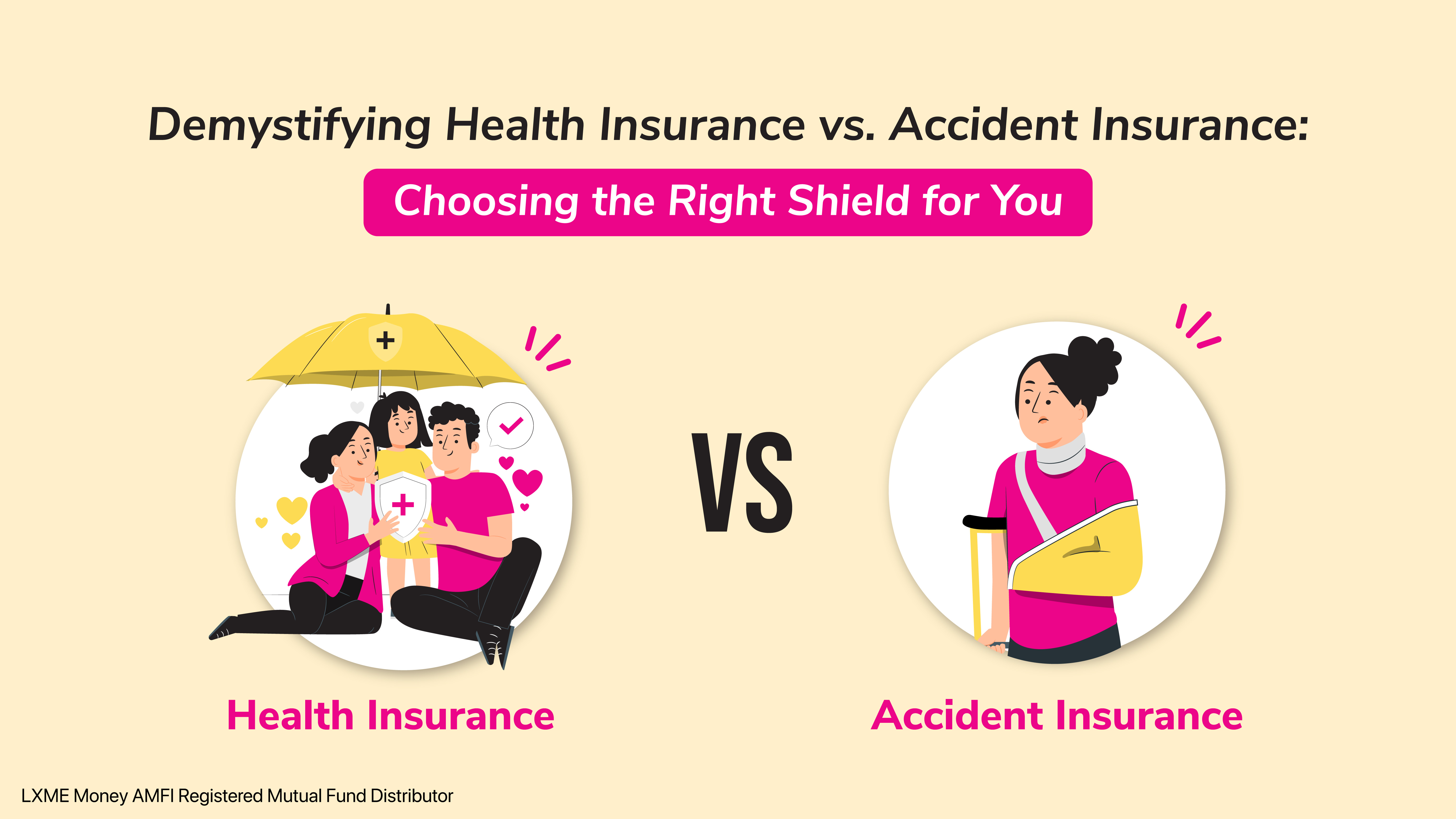There’s a definite comfort in knowing that even if your health takes an unexpected turn, you and your family have a financial safety net. When money is tight, though, paying for both a life insurance policy and healthcare coverage each month can get tricky. As expenses start to mount, it can be tempting to drop one or the other to make ends meet.
However, they are both saviours during unexpected contingencies and play a pivotal role in our lives.
Life vs. Health Insurance
Each type of insurance serves a completely different purpose and offers different coverage. Here are 6 key areas of difference between health and life insurance:
| Life Insurance | Health Insurance | |
| Purpose | Life insurance pays out a death benefit to your family in the case of premature death. | Health insurance helps pay for medical expenses such as doctor’s visits, hospital stays, medications, tests, and procedures. |
| Tenure | Long-term plan | Short-term plan |
| Maturity | Life insurance will begin cyclic pay-outs after the maturity date along with a lump sum death benefit. | Health insurance does not have a maturity date. You can only make claims against actual expenses, limited to the maximum sum insured. |
| Scope of Coverage | Both available with individual and group coverage. | |
| Premium Payments | The premiums are both fixed and flexible depending upon the type of Life insurance picked. | The premiums are mostly fixed. |
| Tax Benefits | Premium payments can be claimed under Section 80C, Section 10 (10D) of the Income Tax Act. | Premium payments can be claimed under Section 80D of the Income Tax Act. |
What are the benefits of Life Insurance?
- Financial security and protection are the two most important benefits of Life Insurance.
- Pay-outs are generally tax-free.
- A guaranteed death benefit.
What are the benefits of Health Insurance?
The main purpose of health insurance is to receive the best medical care without any stress on your finances. Health insurance plans offer protection against unexpected medical emergencies. The premium paid at one go allows tax benefits for the number of years of insurance coverage and this is just one benefit you get from having a health insurance policy. Some of the other benefits are:
- Restoration Benefit – is a coverage in your health insurance, in which if your Sum Insured gets exhausted towards treating an ailment, the insurance company restores it.
- Critical Illness Cover – If opted for as an add-on or a part of the plan, this covers hospital expenses in case of critical illness.
- Maternity Benefit – This benefit if opted for, takes care of the hospitalization and all related expenses when a mother-to-be is admitted for delivery. It also takes care of the expenses of any treatment required in case of any complications.
- Accidental Hospitalization – This benefit covers costs of Ambulance, Day-care procedures, Pre-hospitalization, and Post-hospitalization expenses that include ICU, Medication, OT, Physician Fees, Diagnostics, and more in case of an accident.
Life is uncertain and contingencies come without knocking. So it is better to make sure that you are not financially affected by a medical emergency or that your family does not face any financial hardship in case of your sudden demise, and buy both life insurance and health insurance. Both these insurance policies are crucial for each one of us.
So when is the right time to purchase Life Insurance and Health Insurance?
When you are in your 20’s:
This is an important phase of our lives as we set our aims and explore new things. At a young age, we don’t realise the importance of insurance. But it is, decidedly, the best time to kick-start your coverage. One must buy term insurance in her 20’s to beat any unexpected contingencies. Also, investing in a medical or health plan is a wise idea now. If your employer covers you in a group health insurance plan, that is also sufficient at this age. Women can opt for maternity cover so that the initial waiting period of 3 to 4 years is served before one needs to make a claim.
When you are in your 30’s:
At this age, you have lots of responsibilities starting from parents to spouse and kids. So, ensure that you factor them in your plan accordingly. In your 20s, a term plan seems enough but as you enter your 30s, you should include a child plan. If you have children, this plan secures their future. If you have health insurance, then increase the Sum Insured or go for a family floater that includes your entire family.
When you are in your 40s:
This is the age of building your life assets. Buying a term plan is necessary when you plan your financial decisions. Also, an endowment plan will help you save more and get a substantial fund at the time of maturity. One should plan her financial preparation for retirement from their 40s. From this age onwards, you need to pay more attention to your health so sticking to a family floater plan is a good option. This proves more affordable compared to the separate health policy you could buy for each family member. By adding a top-up cover you can increase the health coverage as well. These days, lifestyle diseases are common, so buying a critical illness cover has become a necessity.
When you are in your 50’s:
This is the time when you should plan your expenses focussing heavily on your retirement plan. Now, you must buy a pension plan that ensures you get a lump sum amount monthly as an income post-retirement. Your existing comprehensive health insurance plan is still your companion in need.
When you are in your 60’s:
This is the most critical phase of one’s life. Old age requires utmost attention. It is difficult to purchase a plan at this age owing to the fact that you stop earning or sometimes may be dependent on others. However, you should approach the insurance companies that target senior citizens and offer plans as per their requirements. Or you can continue with the existing term plan with a lifetime renewal facility. There are senior citizen health insurance plans offered by various insurers, which take care of your old age-related health issues and cover the medical expenses incurred. If you already own one, consider converting this to a comprehensive health plan.
While most of your financial planning should be around mutual funds, equity funds, and other investments, insurance is important too. Safeguard yourself and your loved ones by putting some money into both life and health insurance!
Similar blog you may also like to read – Health Insurance for Women
New Investor? Request a Callback.
Fill in your details and we will guide you at every step
other blogs

Insurance July 3, 2024
Demystifying Health Insurance vs. Accident Insurance: Choosing the Right Shield for You
In today’s world, insurance for women is paramount, and safeguarding your health is a crucial part of that equation. But with a range of insurance options available, navigating the world of health and accident coverage can feel overwhelming. Here’s where understanding the key differences between health insurance vs. accident insurance becomes critical. This blog post, … Demystifying Health Insurance vs. Accident Insurance: Choosing the Right Shield for You

Insurance Mutual Funds May 3, 2024
Financial Security Quiz: Empower Your Investment Decisions
The Financial Security Quiz (FSQ), is designed to help you understand and optimize your financial strategy through an asset allocation tool and personalized insights. What is the Financial Security Quiz? Asset Allocation Calculator Determine the ideal way to divide your investments across various asset classes with our asset allocation calculator. Whether you are looking for … Financial Security Quiz: Empower Your Investment Decisions

Insurance March 14, 2024
Exploring Differences Between Health and Life Insurance
One of the most important parts of planning for the future is having insurance for yourself. Both life insurance and health insurance are crucial forms of risk mitigation that provide financial protection in the event of serious injury, illness or untimely death. Of course, they do this in different ways. Here are 6 key areas … Exploring Differences Between Health and Life Insurance









